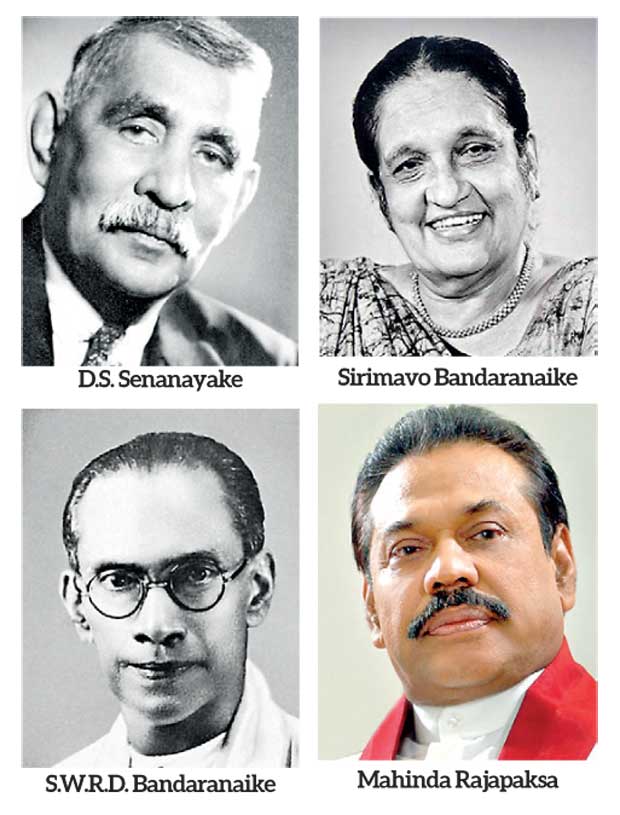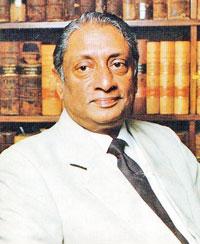Reply To:
Name - Reply Comment
Last Updated : 2024-04-25 18:55:00

The unicameral legislature for Ceylon (Sri Lanka), The State Council [SC] was established in 1931 under the Donoughmore Constitution replacing the Legislative Council of Ceylon, the nation’s original legislative body. The commission recommended universal adult franchise to the Ceylonese people long before our giant neighbour India achieved the privilege. There were two State Councils: the first, elected in 1931, and the second in 1936 which lasted till 1947, when the Soulbury Constitution replaced it with a bicameral parliament, as a prelude to constitutional improvement leading up to granting of autonomy on February 4, 1948.
The State Council was an experimental structure; it was based in part on the UK’s London County Council, functioning in both capacities as executive and legislative. Seven committees performed executive functions. Each committee was chaired by an elected Ceylonese called minister. The ministers formed a board with three British members of ministerial status who handled Defence, External Affairs, Finance and Judicial. The SC consisted of 58 members, of whom 50 would be elected by the people, with the remaining appointed by the Governor.
Being asked about suspected misappropriation of Tsunami relief funds in 2005 during a BBC interview, the late Foreign Minister Lakshman Kadirgamar said he did not want to beat around the bush or make petty excuses; while acknowledging that there were such allegations and they had to be investigated, he brilliantly drove home the point that, “Wherever there were money and humans, there was corruption.” This, really, is the state of affairs anywhere on the planet.
However, the fact remains that the plague of corruption that destroys the society must be eradicated with as much effort as possible. What needs to be done is to initiate a course of action intended at putting bribery and corruption or at least dropping them to a bare minimum. 
The Parliamentary Committee on Public Enterprises (COPE) had exposed several high profile shady deals involving state institutions in the past as well. The LMS land deal, Waters Edge scandal and the sale of the Sri Lanka Insurance Corporation were annulled by the Supreme Court in the past as unscrupulous deals. Sadly, the Commission to Investigate Allegations of Bribery or Corruption (CIABOC) is dealing with the matters at an extremely-slow pace.
In 2010, there had been a proposal by an MP. If my memory serves me well, it was none other than the controversial man Wijeyadasa Rajapakshe himself, who proposed to the Speaker that no minister or deputy minister be appointed either to the two watchdog committees COPE and the Public Accounts so as to prevent ministerial interference with probes into public institutions. He wanted only ordinary MPs instead. He had a strong point. Having some ministers on committees probing misdeeds in the public sector is like, as a popular saying goes,––horage ammagen pena ahanava vage, [soliciting the help of a female soothsayer to catch a thief who happens to be her own son]
Proving the theory of Kadirgamar correct, corruption and bribery existed among legislators, even during colonial times.
The oldest of such incidents on record runs back to the State Council era in 1942/43, where the British Governor appointed L.M.D. de Silva, the one-man commission in 1942 to investigate bribery allegations against several legislators. The Commissioner, a senior Solicitor and close friend of D.S. Senanayake, served as Privy Councillor in Briton. The Commission found eight of the State Councillors guilty: unbelievably, the eight corrupt included three Englishmen appointed by the representative of King George VI the Governor himself, and the rest all locals elected by the people. All of them except E.R. Thambimuththu MP for Trinco-Batticaloa, tendered their resignations immediately unlike the shameless types of today who would ‘proudly’ occupy a backbench to receive accolades for his ‘heroic move’ from the rest of colleagues and party leaders. They even bid goodbye to politics altogether being unable to face the people. Acting swiftly was D.S. Senanayake, the leader of the House who moved at the very next sitting of the council, for the removal of Thambimuththu from the State Council.
In late 1950s, Prime Minister S.W.R.D. Bandaranaike appointed the Thalgodapitiya Commission against his own party men which reported six of them [three being close associates of SWRD] guilty of corruption.

"while acknowledging that there were such allegations and they had to be investigated, he brilliantly drove home the point that, “Wherever there were money and humans, there was corruption"
The Prime Minister was assassinated; successor Sirimavo [1960-64] failed to take punitive action against any of the members, for Dudley Senanayake government to fix them in 1965. Punitive action was imposed under special legal provisions to withdraw civic rights of, [except for A.P. Jayasuriya (SLFP), the Home Minister who got the benefit of doubt when the man who offered the bribe made contradictions under cross examination by the cream of legal emissaries of the age, G.G. Ponnambalam QC and M. Tiruchelvam QC] the following members: R.E. Jayatilleke, D.B. Monnekulame Dep Min., Henry Abeywickrema Dep Min., C.A.S. Marikkar, Minister, M.P. de Zoysa all of SLFP and M.S. Kariapper [ITAK] crossed over and sworn in as Dep Min. A.P. Jayasuriya was accused of accepting a bribe of Rs. 300 [today’s equivalent of 50,000/] and a bag of rice as a reward from Punchi Appuhamy of Udagaldeniya, to promote his candidature for the post of V/Headman [Ralahami].The UNP-SLFP unity government hot on corruption sought a mandate to act against the corrupt, and promised to weed out dishonesty in all its manifestations. It blamed the Rajapaksa government of misconduct, but today, it is also troubled by the issue of corruption.
The openness displayed by the Maithri-Ranil Yahapalanaya in exposing corruption and misdeeds by members of the governments, both present and past, is something that never existed during Chandrika or Mahinda regimes. There is an unusual delay in prosecutions, no doubt; just a few cases had been investigated and prosecuted, with many more corrupt cases to be taken up for action upon through a complex legal procedure. Whatever the final verdict is going to be in accordance with the judicial intricacies involved in the process, the programme would make the perpetrators guilty in the public court of opinion. Revelations at the Presidential Commission have caused irreparable damage to the unity government of SLFP-UNP, with the latter taking up the major share of the beating.
A team of well-to-do men implicated in unashamed corruption involving insiders in dual roles offering insider intelligence and some others executing transactions cheating poor labourers of their hard-earned paltry savings in the Employees Provident Fund. Evidence unfolding before the PCoI is appalling. There is ample proof of attractive gratifications received in return by the participants. The PCoI and AG’s Department, before they conclude their enthusiastic efforts at the end after the Bond saga the President should extend their term to cover the Rajapaksa era scams too.All criminals should be exposed and brought to book under special laws for stripping off their civic rights for life and not allowed to mark time seated in the back row.
"The ordinary voter, after enjoying universal franchise for seven decades, is now at crossroads"
Mahinda Rajapaksa is no statesman; he did not endeavour to bring in reconciliation among the communities. He put his relatives and henchmen in important positions and robbed state coffers, Rajapaksa cronies earned billions through commissions and kickbacks from uneconomical huge projects. He attacked his critics and went about strong arming his adversaries. In the span of four years, cronies became overnight billionaires. He did not have the intellect to understand the basic dignity of minorities. He thought developing infrastructure in the North would solve the problem. Rajapaksa, however, gave leadership to the war; we have to blame past leaders for their lethargic approach. MR gave the authority to the forces against enormous international pressure, especially during the latter stages of conflict in April-May 2009. Under his command the military completely wiped-out the LTTE’s fire-power. We as general public of this secular nation must shield the political as well as military leadership and all those implicated from the foreign agencies clamouring to try them before an international bench.
The ordinary voter, after enjoying universal franchise for seven decades, is now at crossroads, unable to come to terms with one of the only two alternatives—a weak Ranil-Maithri Yahapalanaya with no direction, control or plan and a highly corrupt autocratic ex-ruler.
A general decline in the quality of elected has been a universal issue for the past couple of decades. To quote two examples, our big neighbour`s highly-deplorable fraudulent system a few years ago compelled the administration led by Sonia Gandhi and Manmohan Singh to make quite a few restructurings, by empowering the agencies with autonomy to act, and they too introduced many professionals and youth into the system: The UK’s House of Commons being another good example where members and some Cabinet ministers accused of making bogus housing and expenses claims out of state funds, and accepting bribes from corporate bodies for granting contracts resulting in a ‘London Times poll’ held in 2011, for people to vote the then Parliament the worst ever.

Add comment
Comments will be edited (grammar, spelling and slang) and authorized at the discretion of Daily Mirror online. The website also has the right not to publish selected comments.
Reply To:
Name - Reply Comment
US authorities are currently reviewing the manifest of every cargo aboard MV
On March 26, a couple arriving from Thailand was arrested with 88 live animal
According to villagers from Naula-Moragolla out of 105 families 80 can afford
Is the situation in Sri Lanka so grim that locals harbour hope that they coul